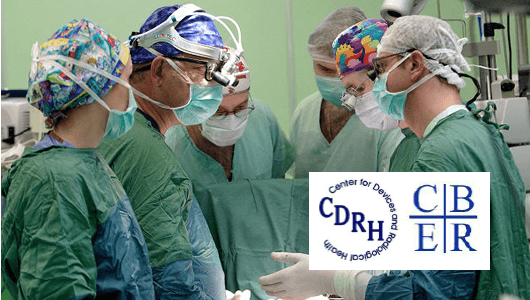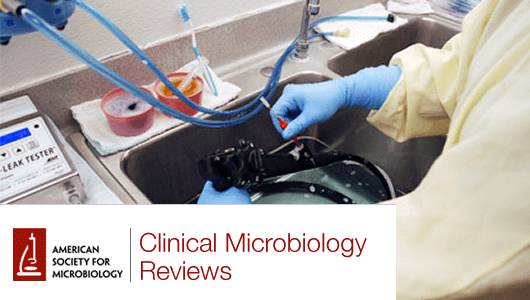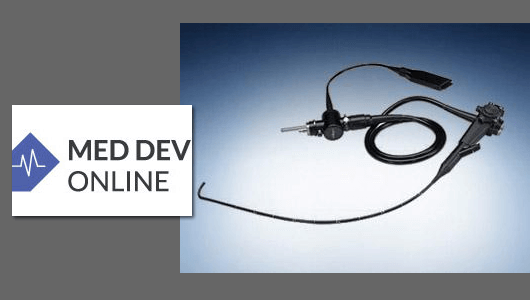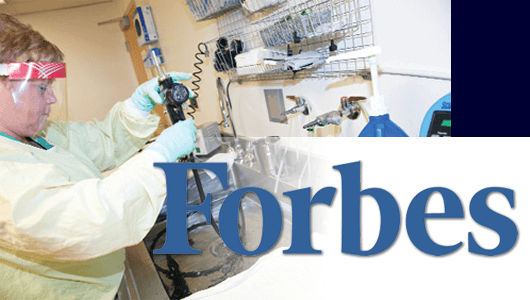Reprocessing Medical Devices in Health Care Settings
This guidance provides recommendations for the formulation and scientific validation of reprocessing instructions for reusable1 medical devices. This guidance document also provides recommendations for the content and review of premarket notification submissions [510(k)], premarket approval (PMA) applications, humanitarian device exemption (HDE) applications, de novo requests and investigational device exemption (IDE) applications, concerning the labeling instructions for reprocessing reusable medical devices.
Seattle Times: Navy vet’s death blamed on contaminated medical scopes
From The Seattle Times: A retired Navy chief petty officer treated at the Seattle Veterans Affairs hospital may have been the victim of a deadly infection tied to dirty medical scopes — and to scope-washing [...]
American Society for Microbiology: Transmission of Infection by Flexible Gastrointestinal Endoscopy and Bronchoscopy
Most contemporary flexible endoscopes cannot be heat sterilized and are designed with multiple channels, which are difficult to clean and disinfect.
Antibiotic-Resistant ‘Superbug’ an Emerging Threat
A relatively new antibiotic-resistant bacteria called CRE is making inroads in some major American cities, U.S. health officials report.
Contaminated Duodenoscopes: The Story of a Chance and Distressing Finding
It started with a chance discovery, a lucky break that revealed an unlucky situation.
Unsedated transnasal endoscopy effective, lower-cost for monitoring pediatric EoE
Unsedated transnasal endoscopy was shown to be a safe, well-tolerated and lower-cost alternative to esophagogastroduodenoscopy for evaluating pediatric eosinophilic esophagitis, according to recent study data.
Unsedated Transnasal Endoscopy Safe for Children With Eosinophilic Esophagitis
Unsedated transnasal endoscopy (TNE) is a safe, low-cost procedure that can help physicians evaluate paediatric patients with potentially chronic problems in their oesophagus, according to a study published in the journal Gastrointestinal Endoscopy.
People: Melissa Rivers Says Joan’s Death Was ‘100 Percent Preventable’
Melissa Rivers says that her mother Joan Rivers' death could have been avoided.
Can We Design Medical Devices To Be Reprocessed Without Killing People?
Reprocessing has taken center stage in the medical device industry over the past two months, thanks to several high-profile “superbug” outbreaks that were linked to the use of contaminated duodenoscopes (type of endoscope) at two prominent U.S. hospitals.
Deadly bacteria on medical scopes trigger infections
The deadly pattern of illnesses began to emerge in 2012 at hospitals in Seattle, Pittsburgh, Chicago. In each case, the culprit was a bacteria known as CRE, perhaps the most feared of superbugs, because it resists even "last defense" antibiotics — and kills up to 40% of the people it infects.
Nightmare Bacteria And Dirty Scopes – Ignorance And Want In Medicine
From Forbes: A deadly strain of antibiotic-resistant bacteria, dubbed “nightmare bacteria” by the head of theCenters for Disease Control and Prevention (CDC), has struck again. This time two people died and 179 were exposed to [...]
Tribune: Melissa Rivers files lawsuit in mother Joan Rivers’ death
While Joan Rivers lay sedated in a Manhattan clinic, her doctors performed unauthorized medical procedures, snapped a selfie with the comedian and failed to act as her vital signs deteriorated, according to a malpractice lawsuit filed Monday by her daughter, Melissa.












